Stephen Schwartz: Career Updates 2008 to 2010
from The Schwartz Scene
ON THIS PAGE
- Quarterly updates CONTINUED. These updates, written by Stephen Schwartz, were originally published as part of The Schwartz Scene newsletter, edited by Carol de Giere
- Links to additional archives
Stephen Schwartz Updates The Schwartz Scene Archive 2008 - 2010
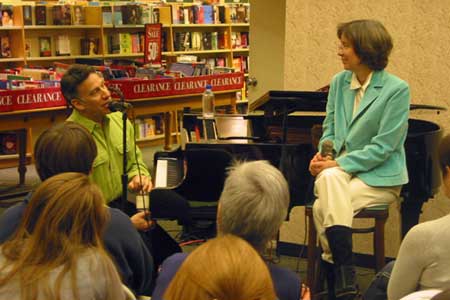
Photo: Stephen Schwartz (left) at the piano answers questions from Carol de Giere (in green), biographer and editor of The Schwartz Scene newsletter. This was a book talk for the Schwartz biography Defying Gravity: The Creative Career of Stephen Schwartz, from Godspell to Wicked at a Barnes & Noble in Skokie, Illinois, in 2009. (Photo by Steve Solomon).
Updates for The Schwartz Scene
Please DO NOT copy and paste this copyrighted content into your own blogs or websites. You may link to this page but do not copy the content. Thanks.
30. Stephen Schwartz's Update Winter 2008
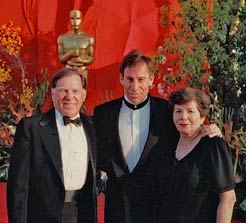 [PHOTO - The photo of Stephen (center) with his parents at the Oscars is from 1996, but it conveys that red carpet feeling for Stephen's report below.]
[PHOTO - The photo of Stephen (center) with his parents at the Oscars is from 1996, but it conveys that red carpet feeling for Stephen's report below.]
February 25, 2008
I'm sitting on the plane back to New York from last night's Oscar show in LA. Strangely enough, being certain going into the show that Alan and I weren't going to win made it the first awards show I think I've ever actually enjoyed attending. without the nervousness of wondering what the outcome would be and trying to remember a speech, I could just relax and be amused and bemused by the glitz and over-the-topness of it all. I would have had a complete blast if the show had been better (it seemed oddly flat to me, as if the Oscars were echoing the continuing depressed mood of the country.)
But inching down the red carpet, answering the same mindless questions over and over and hearing fans in the bleachers scream for movie stars in identical gowns while the neon of the El Capitan marquee shone across the street, I found myself marveling at the completely unexpected turn my life had taken. When I was a kid, I'll admit I fantasized about being a Broadway composer, doing things like inventing long-run statistics for my imaginary musicals (such as "Hi, Dog! … 873 performances"). But never did I imagine working in the movies. So last night, I stood there wondering: How did I end up here, on my way to the Oscars (again!) to watch three (three!) songs I co-wrote be performed on the show?
You know, writing this, I realize it didn't matter that the Oscar show itself was flat this year — I had a complete blast.
My plane is landing (sorry… I took time out to watch Dan in Real Life – and then they switched it off before the ending), so this is going to be a very short Quarterly Update. Next time I'll report on progress on the opera of Seance on a Wet Afternoon, and My Antonia at the Rubicon Theatre this coming spring. Today I'm still feeling the surprising afterglow of an absurd, improbable, and really fun Oscar evening.
Thanks for reading as always, Stephen Schwartz
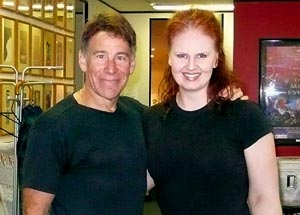
PHOTO—Stephen Schwartz and Kellie Dickerson, music director for the Australian production.
NO SPRING ISSUE for 2008
31. Stephen Schwartz's Update Summer 2008
Note from Carol de Giere: I waited to send this issue until I had met a deadline for my book Defying Gravity: The Creative Career of Stephen Schwartz from GODSPELL to WICKED. This authorized book has been eight years in the making. I have been fortunate to receive comments from four of Stephen's associates for use on the backcover: Gregory Maguire, Winnie Holzman, Lynn Ahrens, and Stephen Flaherty. You'll find their praise for the book and many more details, including the table of contents, and ordering information on www.defyinggravitythebook.com. I have "tested" the book with about 10 fans of musicals, ages 15 through 75, and they all enjoyed looking through the photos and reading the chapters.
From Stephen Schwartz
July 27, 2008
A lot has been happening since I last checked in with all of you.
The big news, at least from my point of view, is that I have finished a first draft of the opera I'm writing, an adaptation of the psychological thriller " Séance on a Wet Afternoon." Just in time, too, as next month in Santa Barbara I will be doing a workshop of the second (and final) act. I'm sure this will lead to revisions, and I still have revisions of the first act to write, but as I am fond of saying, revisions are a lot easier than visions. The premiere of the opera will be with Opera Santa Barbara in September of 2009, so much work lies ahead. But the fact that I have gotten all the way through a complete draft feels like an enormous accomplishment to me ... and comes as a great relief!
In addition, I have been doing a little work for the upcoming Broadway revival of "Godspell," which begins performances on September 29th at the Barrymore Theatre. This will be the first time "Godspell" has been back on Broadway since the original production ended its run thirty years ago. At the request of the director, the smart and skillful Danny Goldstein, I've written a new musical section to connect the two halves of "Learn Your Lessons Well," so that it will now all be one number. We've also done a bit of replacement and rewriting of the philosophers in the "Prologue," which of course has involved some new lyrics as well.
I went to a day of the "Godspell-y" theatre games workshop Danny did with the cast last week. I showed up for the talent show, in which the cast showed off many of their more obscure talents, which ranged from imitations, playing instruments and gymnastics to baton twirling, burping on cue, and making farting noises with their armpits. After wiping the tears of laughter from my eyes, I was happy to feel that, as "Godspell" productions tend to do, this cast features ten of the most talented (and funniest) performers around.
Meanwhile, "Wicked" has recently opened in Melbourne, Australia, to great acclaim. Unfortunately, I wasn't able to get back Down Under for the premiere, but I heard from our producer Marc Platt that it is a terrific production and the performers are great. I'm glad it will give me an excuse to revisit Australia, which I loved when I was there last January.
Closer to home, "Wicked" recently achieved a personal milestone for me, becoming my longest-running Broadway show (although it still has a couple of years to go to catch "Godspell," which ran 2600+ performances in its combined off-Broadway and Broadway run). An Emailer recently pointed out to me that only two other composers in Broadway history have had three shows run more than 1500 performances on Broadway, Jerry Herman and Andrew Lloyd Webber. In doing some research after receiving this information, I discovered an interesting bit of trivia with which I stumped my statistical Emailer: While I am now the only songwriter in Broadway history to have three shows run more than 1900 performances ("The Magic Show" 1920, "Pippin" 1944, and now "Wicked" 1950+), there is one other writer who can claim this distinction. My Emailer couldn't guess the answer -- can you? The answer is at the end of this update.
And while I'm reporting accomplishments, I have one more to talk about, albeit it's not mine. Many of you may know that Carol de Giere, the woman responsible for this Website, has been writing a book about my career, which she has been working on for a loooooong time. Well, it's done! Applause Books is releasing it this coming September. It's entitled "Defying Gravity" (natch), and it tells you as much as anyone could possibly want to know about the writing of "Wicked" and "Godspell" (in sections detailed enough practically to be books in themselves), plus "Pippin" and my other shows and the Disney and DreamWorks movies. It charts the roller-coaster ups and downs of my career and includes creative ideas and process suggestions from myself and others, reprints of lyrics and original music manuscript, plus a ton of photos. Having read it, I can tell you I like it very much, and I'm very impressed with what Carol has achieved with this book.
So yes, all in all, it's been a period of accomplishment all around. with any luck, there'll be more to report next update. Enjoy the rest of your summer!
Stephen Schwartz
(Answer to trivia question: Thomas Meehan, author or co-author of "Annie" 2377, "The Producers" 2502, and "Hairspray" 2449+)
32. Fall 2008
This issue included event listings, etc. Stephen didn't have time to write an update.
33. Winter 2009
No Schwartz update
34. Spring 2009
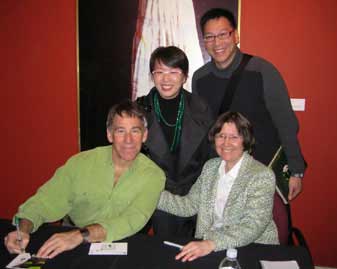 Stephen Schwartz, Alice and Scott So (fans of Stephen's music), and Carol de Giere pose for a photo during the book autographing session at the Museum of Performance and Design book signing, January 2009.
Stephen Schwartz, Alice and Scott So (fans of Stephen's music), and Carol de Giere pose for a photo during the book autographing session at the Museum of Performance and Design book signing, January 2009.
Editor's note: In late January, 2009, Stephen Schwartz traveled to San Francisco to meet with media and attend the opening of Wicked there. He also appeared for an event featuring my new book Defying Gravity. I interviewed him in front of a crowd of 120 fans at the San Franicisco Museum of Performance and Design. The Museum recorded the talk for its archives. Anyone may make a reservation with their library to enjoy the video that includes Schwartz playing piano and singing four of his songs.
Other Schwartz news: On March 19, 2009, it was announced that Stephen Schwartz has become the president of the Dramatists Guild of America, the national association of playwrights, composers and lyricists. Schwartz commented: "I'm extremely honored my fellow dramatists have chosen me to be the president of their Guild. On behalf of all of my fellow Guild members, I would like to thank John Weidman [former president] and Marsha Norman [former vice president] and the other officers for their amazingly productive work and the dedication that they've shown over the last ten years. I hope to continue to move the Guild forward in the direction they have led and to try to live up to their very high standards."
He received the Richard Rodgers award in Pittsburgh on May 9th in reconition of his lifetime of contributions of outstanding talents in musical theater.
San Diego's Old Globe Theatre has mounted a "re-envisioned" version of the 1978 musical Working with a score by Stephen Schwartz and others. The show opened recently and received much praise. Working Reworked.
35. Summer 2009
No Schwartz Update. Schwartz was inducted into the Songwriters Hall of Fame.
36. Stephen Schwartz's Update Fall 2009
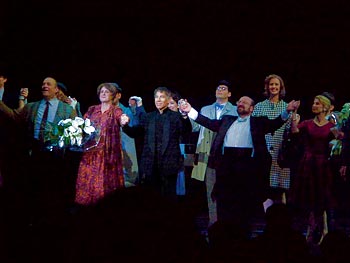 Photo: The Séance cast, Stephen Schwartz (center), and maestro Valery Ryvkyn bow after the opening night performance. Photo by Terence de Giere
Photo: The Séance cast, Stephen Schwartz (center), and maestro Valery Ryvkyn bow after the opening night performance. Photo by Terence de Giere
It has been a little over a month since the premiere of my opera, Séance on a Wet Afternoon, in Santa Barbara, California. I am now officially "post-op". This was probably the most challenging project I've ever undertaken and the greatest learning experience I've ever had.
As one example, writing for "legit" voices, I became aware of issues such as the passagio - the couple of notes in an opera singer's voice between their chest and head voices where it is uncomfortable for them to stay for any length of time. Therefore one wants to write mostly above or below that point. It's different for each voice type (soprano, mezzo, tenor, etc.) and to some extent slightly different for each individual singer. This is not something that comes up at all in writing for Broadway or pop singers. Opera singers know their own voices extremely well and what they can or can't do with their instrument. I had a fascinating moment when I was going over an aria with our brilliant leading lady, the soprano Lauren Flanigan. At one point on a big high note, I said to Lauren that I wanted a very warm sound because of the emotional content of the moment. Lauren replied instantly, "Oh, well, then you don't want me on the high A where you have me; I can give you power on the A but for the warmest sound you probably want me on the G#." So of course I rewrote that section of the aria so it was a half-step lower.
In addition, of course, opera is performed unamplified, so one can't rely on miking to lift the singers above the orchestra. I felt that one of the things I could bring to contemporary opera was a strong sense of musical story-telling, but therefore the words needed to be comprehensible and thus clearly heard. So there was always a balance to consider - keeping the music light enough under the singing but swelling up in the moments between sung lines. I thought of it as a kind of "vertical" writing, with carefully worked out peaks and valleys, whereas for theatre or recording, the miking allows a more "horizontal" accompaniment that flows along under the amplified voice. And in order to make sure that these unmiked voices were comprehensible, I had to consider when to take them up to high notes, particularly for the female singers, since in order to produce the sound up there, all the vowels have to be essentially the same and therefore far more difficult to understand. If all this sounds very technical, it is, and yet of course the music has to sound natural and flowing and emotionally true; the audience mustn't be aware of the technique, just the story and what it makes them feel.
But by far the biggest challenge for me was the orchestration. Séance is scored for a 46-piece orchestra, and I had never done anything even approaching such a thing. I was very fortunate to be able to enlist the help of my orchestrator for Wicked, William David Brohn. In addition to his impressive Broadway credits, Bill has done extensive classical and opera orchestrating, so his vast knowledge was enormously valuable. We wound up splitting the orchestration chores about 50/50 - to oversimplify the process: I basically did the "set pieces" and Bill did much of the "scene" sections. But we went over everything together, truly collaborating, and for me it was like having a private orchestration tutor or mentor for a year. I can't believe how much I learned, and I will always be grateful to Bill for his generosity. After years of watching Broadway orchestrators knock out an arrangement in what seemed like no time, orchestrating myself and discovering how difficult it can be has given me even greater admiration for the Bill Brohns, Michael Starobins and Jonathan Tunicks of the world.
One of the things I most enjoyed in the composition of Séance was the chance to use the kind of motific writing I have been exploring in scores like Children of Eden and Wicked, but far more extensively and with greater complexity. So much of the emotional story of an opera is told by the orchestra, and the use of themes and motifs in various subtle and interrelated ways to illuminate the subtext and illustrate what the characters are feeling is one of the pleasures of composing for this form.
Séance is a psychological thriller, adapted from a novel by Mark McShane but relying far more on the screenplay for the 1964 movie by Bryan Forbes, which starred Kim Stanley and Richard Attenborough. Bryan was generous enough to provide me with a copy of the screenplay as well as earlier drafts to draw upon if I wished. I would estimate that at least 75% of the libretto was taken directly from Bryan's screenplay(s). But of course, as one does when adapting something and making it one's own, I changed things - the setting (from London to San Francisco), the ending, several important story elements, and perhaps most significantly bringing onstage a character who is only talked about in the movie and doesn't exist in the novel at all, the ghost of the main characters' eleven-year-old son. So when Bryan and his wife, Nanette Newman (who appeared in the film) flew out from London for the opening, I of course felt trepidation as to how they would react to the liberties I had taken. Fortunately, Bryan was extremely enthusiastic (or at least he was kind enough to say so to me.)
Another interesting and ultimately very happy aspect of the experience was that the opera was directed by my son, Scott. This was our first time working together on a new piece of mine, and I suppose that choice might seem fraught, but I never doubted for a moment that he would do an amazing job and that we would have a great time collaborating, and that turned out to be the case. Scott was very helpful to me dramaturgically as I was writing the opera, which was particularly valuable because I didn't have a book writer as I always do with a musical. with his first-rate design team (Heidi Ettinger, David Lander, and Alejo Vietti), he came up with a stunning look for the show, including a "rain curtain" of chains that surrounded the set and a house that turned as characters moved from room to room - it was really wonderful to look at.
Since we were blessed with a cast that not only sang beautifully but were highly skilled actors, Scott was able to get superb performances and to stage it far more like a play than the typical opera "park and bark". Best of all for me as the writer, he not only realized my goals for the piece, but took it beyond what I could imagine, finding in it far more emotion than I knew was there.
So ultimately doing the opera was a very positive experience for me, particularly because what I learned vastly exceeded my expectations.
But though I spent most of the year sojourning in the world of contemporary classical music, I do have a bit of news to report from the pop world: The terrific pop singer John Ondrasik, better known as the group Five For Fighting, has just released an excellent new CD entitled Slice, which includes two songs on which he and I collaborated, the title song and another song called Above the Timberline. John has become a good friend, and of course he's a great singer and songwriter. I'm especially proud of the song Slice; if you're interested in checking it out, the album is on Columbia Records.
As always, thanks for your interest in my work. The rest of 2009 is going to be a lot quieter for me (thank goodness), and then I will have more adventures to report in 2010. I wish everyone a wonderful holiday season.
Stephen Schwartz
36. Stephen Schwartz's Update Winter 2010
I am currently in the midst of working with Sami Parkinnen, the very talented translator who is converting the lyrics for Wicked into Finnish. This is because the first of two “non-replicated” productions of Wicked will be premiering in August in Helsinki, Finland.
By “non-replicated”, I mean that for the first time, there will be a production of the show this is not a duplication of the Broadway production. The other non-replicated production will be premiering at the beginning of next year in Denmark.
Both productions, Copenhagen and Helsinki, will be at theatres which have a history of doing their own productions of shows very successfully, and all of us on the Wicked team look forward to seeing them with great interest. For one thing, since all the touring and foreign companies so far have replicated Joe Mantello’s wonderful Broadway production, we really don’t know if or how the show will work done any other way, so that will certainly be valuable to learn.
We expect to learn a lot about the show in other ways too, just by seeing two fresh takes on it. That’s one of the exciting things about live theatre — a show is always open to reinterpretation and reinvention. Of course, once I have seen the Helsinki production, I will report.
Stephen Schwartz
Theatre Hall of Fame Induction
By Carol de Giere
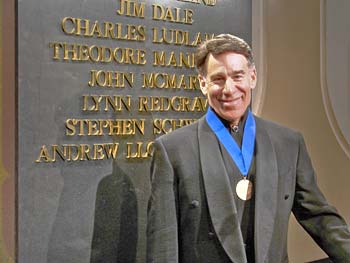 In Broadway’s Gershwin Theatre upstairs lobby, Stephen Schwartz stands beside his name after his induction into the Theatre Hall of Fame, January 25, 2010. Photo by Michael Cole.
In Broadway’s Gershwin Theatre upstairs lobby, Stephen Schwartz stands beside his name after his induction into the Theatre Hall of Fame, January 25, 2010. Photo by Michael Cole.
At long last Stephen Schwartz has been inducted into the Theatre Hall of Fame. This is a rare honor, first of all, because the potential group of inductees is small. Recipients must have at least five Broadway credits to their name. They can be actors, playwrights, designers, directors and producers whose work on Broadway encompasses at least a quarter of a century.
Each year a few individuals are selected by a group of Broadway critics and industry people to join the some 400 of their peers in having their names in raised gold letters adorn the rotunda walls at Broadway’s Gershwin Theater. This years list included Jim Dale, Charles Ludlam, John McMartin, Ted Mann, Andrew Lloyd Webber, Stephen Schwartz, Roger Berlind and Lynn Redgrave.
At the evening event, emcee, Pia Lindstrom (the daughter of Ingrid Bergman), introduced various speakers. Andrew Lloyd Webber was not in attendance but others were. Wicked producers David Stone and Marc Platt stepped up to induct Mr. Schwartz, and praised him for contributing his time to the profession and to young people in seminars. The following is from an article by Christopher Rawson of Pittsburgh Post-Gazette:
[Stone and Platt] also noted the “simple humanity” at the core of his music, its “journey to love and truth,” and said that Mr. Schwartz is “the only composer in the history of Broadway to have three shows that have had runs longer than 1,900 performances each.”
Mr. Schwartz, 61, talked about growing up on Long Island when “many of the names on these walls” made him want to go into theater. He thanked them and many in the audience of theater veterans for “giving me a dream and helping it come true.”
Schwartz formulated his dream of writing musical scores when he was a nine-year-old child watching a Broadway show for the first time. After writing four original shows in college, he had expectations for a successful career. He naturally hoped that his contribution would be acknowledged by his peers. He missed out on Tony Awards, and his work was often dismissed by critics. This recent induction is therefore a special honor that Schwartz greatly appreciates.
Issue 38 – Spring 2010
Stephen Schwartz Update - May 2010
I am sitting in the airport lounge in Helsinki, Finland, on my way back from three days working with the folks at Kaupunginteatteri, the Finnish theatre that will be presenting the first non-replicated production of Wicked beginning this August. By “non-replicated” I mean that this will be the first production that is not based on the Broadway staging and design. I have seen their final dress rehearsals before they take a two-month summer holiday. When I first heard about this uniquely Finnish schedule, I thought it was quaint and funny, since it is based on the fact that since there is such a short period of good weather in Finland, they want to take advantage of it by not working in June and July. But now that I have been here, I have come to realize it actually is quite practical as well, since the first part of the rehearsal process functions as a kind of workshop, and the cast, director, designers and stage crew now have two months to think about what they want to improve or strengthen, and will come back for the three-and-a-half week rehearsal period in August before the premiere with a deeper and richer understanding of their role in the show.
It has been fascinating after all these years of knowing only the (excellent) Broadway production to see a different take on the show. There are some very interesting ideas in the Finnish production – a deeper relationship between Elphaba and Chistery (the flying monkey), who plays a larger, albeit non-speaking, role in the proceedings, a re-imagining of the “Wizomania” sequence in “One Short Day” as taking place in a kind of subversive underground Animal club in the middle of Emerald City, and many political allusions to the historical relationship between Finland and Russia. The set is basically composed of four large abstractly-designed tower units that rotate into different configurations, which characters can clamber over or stand on and in. It was too early in the process to evaluate how well this all will work, but the cast sings, dances, and (as far as I could tell in Finnish) acts with a high degree of talent and skill, and as I say, I found the whole experience fascinating. I am very much looking forward to seeing the finished Finnish product in August. [Link added later Wicked in Finland]
I am headed from here to beautiful Wexford, Ireland, to meet with Thomas de Mallet Burgess, the artistic director of the well-known Wexford Opera House, about the possibility of their presenting a production of Séance on a Wet Afternoon.
The hope is that they will be able to work out a co-production with the Opera Festival in Manaus, Brazil. This surprising potential pairing has come about because I was in Brazil for two weeks in March. I had an amazing time, visiting São Paolo, Salvador, and Rio. In São Paolo, I did some master classes for a young but impressive organization called 4ACT; musical theatre is starting to become more popular in Brazil, and 4ACT is a relatively new school for training aspiring musical theatre performers and writers.
In addition to the aforementioned cities, I also went to Manaus, which is in the middle of the Amazon rainforest, right on the spot where two great rivers meet to form the Amazon. Improbably, they have a beautiful opera house there – the one that was featured in the movie Fitzcarraldo – and every spring they present a famous Opera Festival. The director of the Festival, Maestro Luiz Malheiro, and I had encouraging discussions about their including Séance in a future season. And so my meeting in Wexford, Ireland, could, if all goes well, lead to a co-production of the opera between Wexford and Manaus. I am learning that the world of opera is truly international!
But of course the big Séance news is that New York City Opera will be presenting it for ten performances next spring, in April 2011. This production will star the two extraordinary singer/actors who sang the leading roles in Santa Barbara, Lauren Flanigan and Kim Josephson. It will again be directed by my son, Scott Schwartz (superbly again I’m sure), assisted by the wonderful design team he used in Santa Barbara, Heidi Ettinger, Alejo Vietti, and David Lander.
The fact that this production is happening is an amazing event for me. As you may know, it is sadly unusual for a new opera to receive additional productions after its premiere. I was ready for this to be the case with Séance, but I have to admit that NYC Opera was always my secret dream home for the piece. So to have it now be coming to pass is literally a dream coming true.
As icing on this particular opera cake, next April 21st, NYC Opera is also presenting a gala benefit performance of some of my theatre and film music, with a cast that so far is slated to include Kristin Chenoweth, Raúl Esparza, Victor Garber, and Brian Stokes Mitchell, with more to be announced. Needless to say, with a group like that, it promises to be a special evening.
Coming up for me is more travel – next week I go to Chicago for a day of casting the upcoming Chicago revival of Working. And then I’m off to Australia, where I will be doing concerts and master classes in Hobart, Tasmania, another concert in Sydney and one at the Adelaide Cabaret Festival, and then a meeting in Brisbane with the Opera Queensland folks, who were the co-producers of Séance with Opera Santa Barbara and will be presenting it in 2012. And then finally a little vacation time, heading up to the Great Barrier Reef, where I’ve never been. You can imagine how much I’m looking forward to that!
As always, thanks for your interest, and I wish you all a wonderful summer.
Stephen Schwartz
May 23, 2010
Added note: Kevin Oderik has recorded two rare songs by Stephen Schwartz from My Fairy Tale on his album Unheard: “On the Wings of A Swan” and “Can You Imagine That?” Unheard – hear clips at Amazon.com: Unheard
Issue 39 – Summer 2010
No update from Schwartz
Issue 40 – Fall 2010
STEPHEN SCHWARTZ UPDATE
Nov. 6, 2010
I know it’s been a while since my last update. I was inundated with deadlines and music preparation, etc., but I am finally out from under enough to have time to resume communication.
As I reported in my May update, New York City Opera will be presenting my opera, Séance on a Wet Afternoon, for ten performances next April. (I don’t think I ever expected to see my name hanging on a banner outside Lincoln Center alongside those of Leonard Bernstein and Richard Strauss.) After last year’s production of Séance in Santa Barbara, I wrote a new second act aria for the leading character of Myra, made a few other revisions, and improved (I hope) some orchestration, so I have been working hard getting the musical scores prepared for the conductor and the singers. I am pleased and relieved to report that I delivered them last week. The opera itself goes into rehearsal in the spring, and as you know, it will be the same beautiful physical production as in Santa Barbara, again expertly directed by my son Scott Schwartz, and while most of the cast will be new, the two leading roles will again be sung by the wonderful Lauren Flanigan and Kim Josephson.
I have also been busy going over the Danish translation of Wicked, which is about to begin rehearsals in Copenhagen. This will be our second “non-replicated” production, which, for those of you who are new to this site, means that it will be different staging and design than the Broadway production. This past summer, Winnie Holzman and I had the opportunity to attend the opening of our first non-replicated production in Helsinki, Finland (in Finnish, of course.) It was fascinating to see this new interpretation, particularly because the source material of The Wizard of Oz is not well-known in Finland, so they had to find other cultural resonances for their country. There are strong overtones in the production of the fraught historical relationship between Finland and Russia; for instance, the Wizard looks like a younger Josef Stalin! The tone is darker, a bit more like Gregory Maguire’s novel, with more of a sense of a totalitarian regime, talking animals marked with X’s and being led away, an omnipresent all-seeing eye with a big red pupil watching over Oz rather like the eye of Sauron, etc. I realize this sounds somewhat grim in description, but the show was still funny and touching and the two leading girls and the rest of the cast were absolutely terrific. Winnie and I found it both informative and very exciting, and to celebrate, we took a three-day holiday to St. Petersburg (since we were already in the neighborhood.) What an astoundingly beautiful city that is!
It’s been quite the travel year—I reported last time on my Brazil adventures and what was in store for my June in Australia, and that proved to be a great trip as well. In addition to the concerts and master classes, where I heard some home-grown musicals in development by very talented Australian writers, I got to see Tasmanian devils (adorable and not at all like the Warner Bros’ cartoon version), kangaroos and koalas in the wild, and giant potato cod (yes, they truly are giant) swimming happily around the Great Barrier Reef. Australia remains one of my favorite travel destinations, and I can’t wait till the next time I get to go again (probably 2012.)
Another development this fall is that for the first (and probably only) time in my life, I am being a producer. The show is called The Blue Flower, written by a husband-and-wife team named Jim and Ruth Bauer, and I originally encountered it when it came through my ASCAP Musical Theatre workshop. It is the story of four friends and lovers—two painters, a Dada performance artist, and a female physicist—caught up and buffeted by the currents of history, the time frame extending from World War I and the Weimar Republic in Europe to America in the 50′s. It is startlingly original and has amazing music which is sort of an improbable but marvelous mixture of Kurt Weill and Country & Western (the composer calls the style “Sturm and Twang”.) I saw a showcase performance of the show in New York a little over a year ago, and I was so blown away I felt I had to try to help get it to a wider audience. So I signed on as a co-producer and am now part of a team bringing it to the ART in Boston (run by the insightful and talented Diane Paulus.) It will play there from Dec. 1st through Jan. 8th, so if you’re in the area and want to see a piece of smart, funny, and exciting musical theatre unlike anything you’ve ever seen, come check it out.
Also coming up later this winter is the Chicago production of Working (Chicago in February—yikes!) This is a further development of Gordon Greenberg’s excellent new production which played at the Asolo Theatre in Sarasota, Florida and the Old Globe in San Diego, and it features two exceptional new songs by Lin-Manuel Miranda. I’ll have more to say about it in my next update, I’m sure.
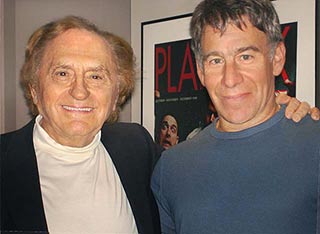 PHOTO: Joe Stein and Stephen Schwartz - copyright by Terence de Giere, 2006
PHOTO: Joe Stein and Stephen Schwartz - copyright by Terence de Giere, 2006
There has been sad news lately. As most of you probably know, my dear friend and collaborator Joe Stein, book writer for The Baker’s Wife and Rags, passed away a couple of weeks ago. He was a warm, extremely decent, and constantly funny human being, who at age 98 (!) was still working on new shows up to his very last day. At his memorial service, his three sons, two stepchildren and a (very witty) granddaughter all spoke lovingly of him, along with Sheldon Harnick, Jerry Bock, Charles Strouse, and John Kander. At the request of his wife Elisa, I sang “Chanson” from The Baker’s Wife. It was a truly uplifting ceremony, filled with laughter as people recounted stories of some of the hilarious things Joe had said; if anyone ever lived an exemplary life, it was Joe, and I found myself thinking this is the way we all ought to go!
Now this morning, as I type this, there has been more sad news. Our lovely original Catherine in Pippin, Jill Clayburgh, has also passed away. I hadn’t seen much of Jill in the intervening years, though she and her family lived not far from me, but I always remember working with her with great fondness.
Well, that is my report for now. I now return to going over the revisions in the Danish translation of Wicked. As always, I thank all of you for your interest and support, and I wish you a wonderful rest-of-the-year and holiday season. Thanks and we’ll “speak” again in 2011.
Stephen Schwartz
NEXT: Schwartz career updates 2011 - 2013
For older updates written by Stephen Schwartz:
- Stephen Schwartz Archive - Wicked Years 1 (2000 - 2001)
- Schwartz Scene Archive - Wicked Years 2 (2002 - 2003)
- Schwartz career interview 2003
- Schwartz career updates 2004 - 2005
- Schwartz career updates 2006 - 2007
To read additional content for The Schwartz Scene back issues see The Schwartz Scene archive
Stephen Schwartz's complete career story is covered in the biography Defying Gravity: the Creative Career of Stephen Schwartz, from Godspell to Wicked. DefyingGravityTheBook.com
 Slice - MP3s
Slice - MP3s